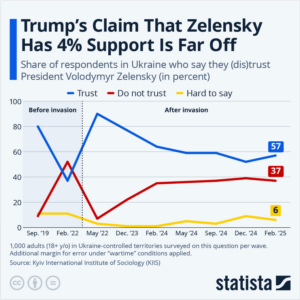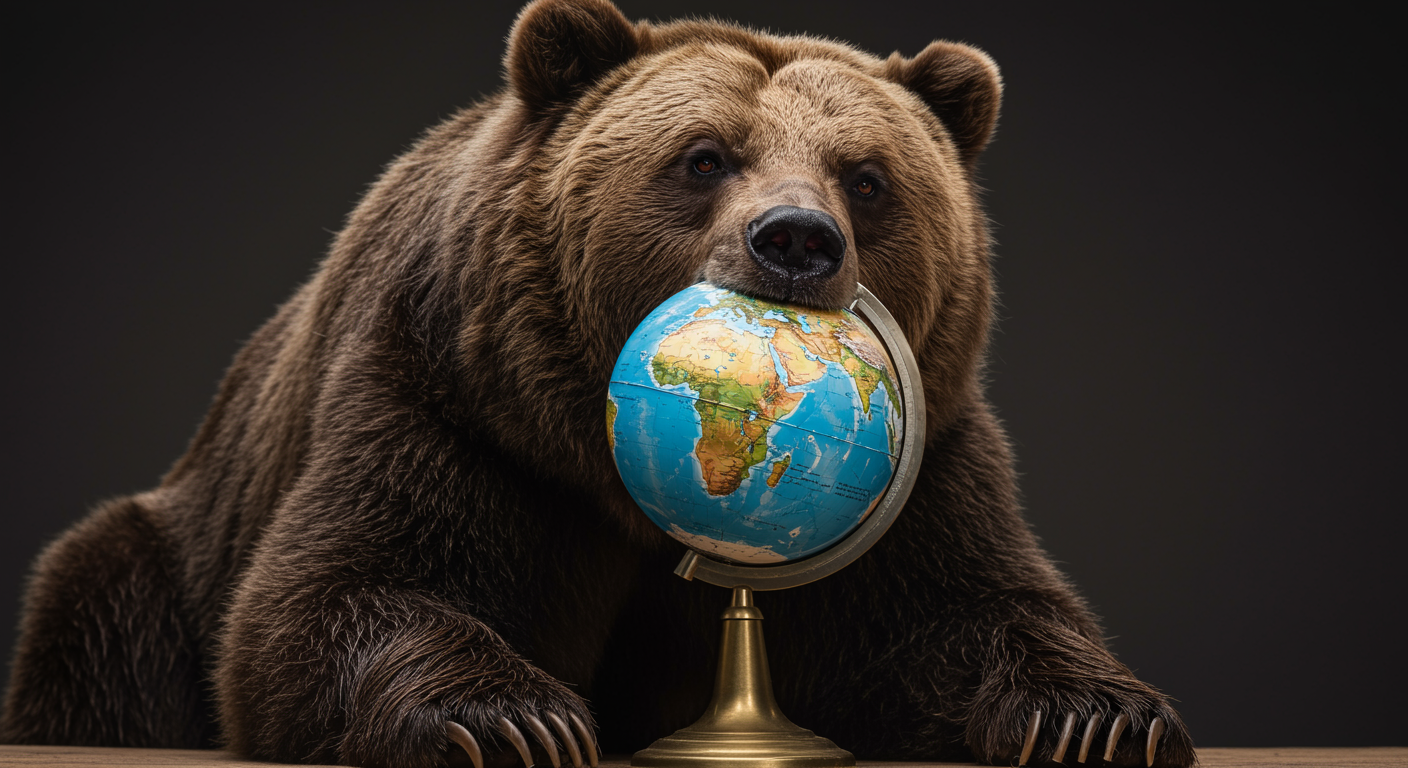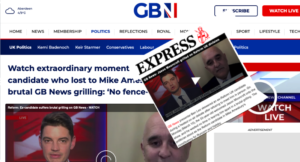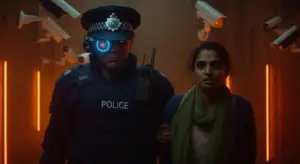Many of us who were looking forward to a Trump presidency couldn’t believe our ears when we heard him suggest Ukraine had started the war with Russia.
To accept that would be to engage in a form of Orwellian doublethink that required supreme self-deception. Whilst those of us on the right who recoiled at a statement that suggested a re-writing of history we had actually lived through, some on the right did not exercise their critical thinking. Instead they endorsed and amplified Trump’s remarks. More fool them.
Trump now appears to have disowned his own remarks criticising Ukraine… “Did I say that? I can’t believe I said that. Next question.”
Now even Trump seems to think his own remarks about Ukraine starting the war and President Zelensky being a dictator were somewhat off-beam. “Did I say that? I can’t believe I said that. Next question.”

Pity the unfortunate Trump cheerleaders who supported these claims that Trump now denies as having said. They now have egg on their face.
The idea that Ukraine bears responsibility for the ongoing war with Russia is a Russian regime narrative. The claim that Ukrainian President Volodymyr Zelensky has hardly any support within Ukraine is a complete fiction. These assertions misrepresent the historical and geopolitical context of the conflict and align with Kremlin narratives that seek to justify Russia’s aggression. Here’s why these claims are fundamentally incorrect.
Russia’s Longstanding Imperial Ambitions
To understand the roots of the war, one must recognise Russia’s long history of exerting control over Ukraine. Since Ukraine’s independence from the Soviet Union in 1991, Russia has sought to undermine its sovereignty, particularly when Ukraine has attempted to strengthen ties with Western institutions like NATO and the European Union. The 2014 annexation of Crimea and the Russian support of separatists in eastern Ukraine were clear signs of Moscow’s intent to subjugate its neighbour.
Putin lied about his invasion of Crimea. In late February, 2014 men in green camouflage military uniforms with no insignia and driving unmarked vehicles but with Russian military license plates, suddenly took up positions in the Crimean Peninsula. These mysterious “little green men” carried Russian military issue weapons and the uniforms appeared to be of standard Russian army origin. Vladimir Putin repeatedly denied they were Russian troops, claiming they must be local Russian Ukrainians.

He told reporters at a news conference on March 4 2014 , “the post-Soviet space is full of such uniforms,” and anyone could have bought them.
The exercise was a classic example of the old Soviet technique of military deception called “maskirovka,” literally “camouflage” and some Putin defenders had been stupid enough to believe Putin.
Once the takeover was a fait accompli, Putin admitted the truth, he had sent in Russian special forces. In his April 2014 Presidential ‘Phone-in’ a smirking Putin told his audience, “Of course, Russian servicemen backed the Crimean self-defense forces.”
Putin’s Justifications for War
Russian President Vladimir Putin has framed the invasion of Ukraine as a response to NAT expansion and alleged Ukrainian aggression. It is true that NATO has expanded to include countries that were once invaded and controlled by Soviet Russia. They are frightened Russia wants to invade them again. You only have to watch Russian state controlled TV to understand why. There are constant threats to invade places like the Baltic states, Poland and even Germany.
In any case Ukraine had no imminent plans to join NATO, and it had no military ambitions that posed a threat to Russia. Russia’s military is huge (or was) compared to Ukraine’s. Instead, Ukraine was simply exercising its right as a sovereign nation to determine its own alliances and policies.
The 2022 Invasion: A Clear Act of Aggression
The full-scale invasion of Ukraine in February 2022 was unprovoked. Russia amassed troops along the border, fabricated claims of Ukrainian genocide against Russian-speaking citizens) of whom Zelensky is one) and launched a brutal assault on Ukrainian territory. Putin told anyone that would listen that he was not planning an invasion.

Later Putin told US talk show host Tucker Carlson in February 2024 the at “it was they [the Ukrainians] who started the war in 2014. Our goal is to stop this war. And we did not start this war in 2022.” Is this what Trump was referencing when on 18th February 2025, he said “…you [Ukraine] should have never started it, you could have made a deal.”?
It makes no sense because Putin admitted he annexed Crimea by sending in Russian special forces. Did Trump not realise?
Zelensky’s True Support in Ukraine
Trump said, “I hate to say it, but he’s down at 4% approval rating.’” It’s impossible to say where this figure of 4% came from. The claim that President Volodymyr Zelensky has only 4% support is entirely unsupported by any evidence. Zelensky was elected in May 2019 with a landslide 73%. Yes, Zelensky’s popularity has declined as the war has dragged on but it’s still high.  For example it was 57% in early February according to the most recent poll conducted by the independent Kiev International Institute of Sociology (KIIS). This rating is comparable to Trump’s support according to a CBS News/YouGov poll from early February 2025 that found that 53% of US citizens approved of Trump’s overall job in office so far. In fact, after the White House meeting, Zelensky’s approval rating increased from 57% to 68%. Trump’s approval rating has dropped to 47% as of 18 March 2025 in a AtlasIntel poll.
For example it was 57% in early February according to the most recent poll conducted by the independent Kiev International Institute of Sociology (KIIS). This rating is comparable to Trump’s support according to a CBS News/YouGov poll from early February 2025 that found that 53% of US citizens approved of Trump’s overall job in office so far. In fact, after the White House meeting, Zelensky’s approval rating increased from 57% to 68%. Trump’s approval rating has dropped to 47% as of 18 March 2025 in a AtlasIntel poll.
Elections in Wartime
Trump has suggested that Zelensky is a dictator because elections have not taken place in Ukraine. However, this is not an unprecedented situation. Throughout history, countries at war have postponed elections to focus on their survival and security. During World War II, Britain did not hold general elections from 1935 until 1945 due to the conflict. Similarly, Ukraine has been forced to delay presidential elections as it fights for its existence against Russian aggression. Holding elections in the midst of an existential war would be logistically impossible since a large part of the country is under occupation. Russia would not even allow an election to tale place in those parts of Ukraine it occupies and now says are part of Russia. A election would potentially undermine national security.
Blaming Ukraine and Misrepresenting Zelensky Benefits Russia
Trump’s claims about Ukraine’s responsibility for the war and Zelensky’s supposed lack of support echo Russian propaganda, which seeks to shift blame away from the Kremlin and onto the victim of aggression. Such rhetoric undermines Western support for Ukraine and creates confusion about the realities of the war. By mischaracterising the origins of the conflict and Zelensky’s leadership, these statements play into the hands of Putin’s regime, which has consistently sought to manipulate public opinion in the West.
Trump’s about-turn
There has been quite a push back on the right against Trumps remarks. Some of his supporters have begun distancing themselves from these claims. Many conservatives and foreign policy experts recognise the importance of supporting Ukraine against Russian aggression and have spoken out against the idea that Ukraine provoked the war or that Zelensky is a dictator because there have been no elections. It has now reached the stage that Trump himself is backtracking.
The Need for Increased European Defence Spending
While Trump’s claims about Ukraine’s role in the war and Zelensky’s support are incorrect, he has made a valid point in urging European nations to increase their defence spending. For years, the United States has shouldered a disproportionate burden in NATO, with many European allies failing to meet the alliance target of spending at least 2% of their GDP on their defence. Trump’s calls for Europe to take more responsibility for its own security are justified, as a stronger European defence posture would not only bolster NATO but also reduce reliance on American military support. However, the UK must not get sucked into an EU led Army. It should be a NATO operation that would include non-EU members like the UK, Norway, Canada and Turkey.
The facts are clear: Russia initiated the war, and Ukraine is defending itself against an unprovoked invasion. Attempts to shift blame onto Ukraine or misrepresent Zelensky’s support distort the historical record and weaken the international response to Russian aggression. It is essential to recognise the realities of the conflict and support Ukraine in its fight for sovereignty and territorial integrity. Polls show Reform voters know this and are supportive of Ukraine. As Nigel Farage has said, “Putin was wrong to invade a sovereign nation.” There can be a peace but not one based on giving in to Russia. The Russian bear is hungry for more.






